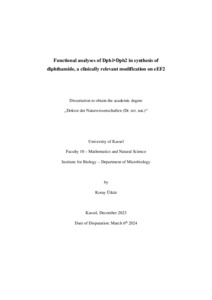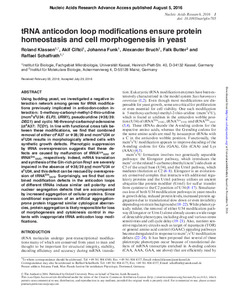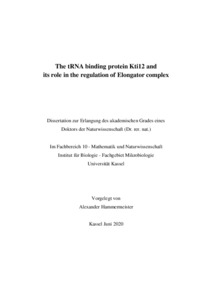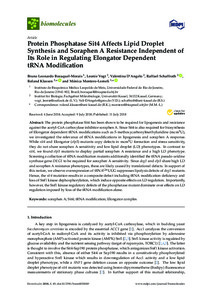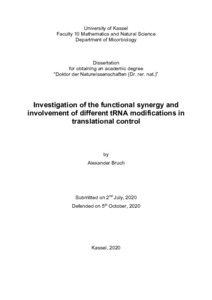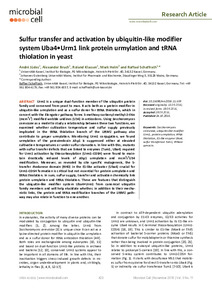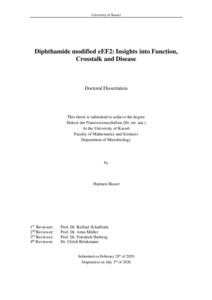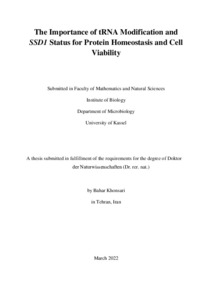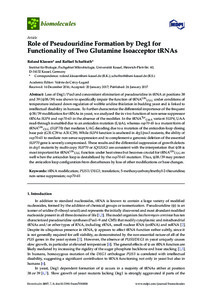Search
Now showing items 1-10 of 20
Dissertation
 Functional analyses of Dph1•Dph2 in synthesis of diphthamide, a clinically relevant modification on eEF2
Functional analyses of Dph1•Dph2 in synthesis of diphthamide, a clinically relevant modification on eEF2
(2024)
Diphthamide is a unique post-translational modification of a conserved histidine on the eukaryotic translation elongation factor 2 (eEF2). During translation elongation, eEF2 induces translocation of codon-anticodon duplexes across the ribosomal decoding center. Diphthamide is involved in fine-tuning of this process by stabilizing the codon-anticodon duplex and maintaining reading frame accuracy. Initially, diphthamide was identified as the target for diphtheria toxin, enabling ADP-ribosylation of eEF2 and resulting ...
Aufsatz
 tRNA anticodon loop modifications ensure protein homeostasis and cell morphogenesis in yeast
tRNA anticodon loop modifications ensure protein homeostasis and cell morphogenesis in yeast
(2016-08-05)
Using budding yeast, we investigated a negative interaction network among genes for tRNA modifications previously implicated in anticodon-codon interaction: 5-methoxy-carbonyl-methyl-2-thio-uridine (mcm5s2U34: ELP3, URM1), pseudouridine (Ψ38/39: DEG1) and cyclic N6-threonyl-carbamoyl-adenosine (ct6A37: TCD1). In line with functional cross talk between these modifications, we find that combined removal of either ct6A37 or Ψ38/39 and mcm5U34 or s2U34 results in morphologically altered cells with synthetic growth defects. ...
Dissertation
 The tRNA binding protein Kti12 and its role in the regulation of Elongator complex
The tRNA binding protein Kti12 and its role in the regulation of Elongator complex
(2020-06-08)
[Summary] Kti12 is a conserved eukaryotic protein showing sequence homology to O-phosphoseryltRNA kinase (Pstk), which is required for the synthesis of selenocysteine tRNA. Saccharomyces cerevisiae Kti12 was originally discovered in a genetic screening for resistance against zymocin, a protein toxin produced by Kluyveromyces lactis. The cytotoxicity of zymocin lies in its anticodon nuclease activity, causing tRNA depletion and cell death in sensitive yeast cells. It recognizes and cleaves a particular wobble uridine ...
Aufsatz
 Protein Phosphatase Sit4 Affects Lipid Droplet Synthesis and Soraphen A Resistance Independent of Its Role in Regulating Elongator Dependent tRNA Modification
Protein Phosphatase Sit4 Affects Lipid Droplet Synthesis and Soraphen A Resistance Independent of Its Role in Regulating Elongator Dependent tRNA Modification
(2018-07-11)
The protein phosphatase Sit4 has been shown to be required for lipogenesis and resistance against the acetyl-CoA carboxylase inhibitor soraphen A. Since Sit4 is also required for biosynthesis of Elongator dependent tRNA modifications such as 5-methoxycarbonylmethyluridine (mcm5U), we investigated the relevance of tRNA modifications in lipogenesis and soraphen A response. While sit4 and Elongator (elp3) mutants copy defects in mcm5U formation and stress sensitivity, they do not share soraphen A sensitivity and low ...
Dissertation
 Investigation of the functional synergy and involvement of different tRNA modifications in translational control
Investigation of the functional synergy and involvement of different tRNA modifications in translational control
(2020-07-02)
Transfer RNAs are essential adapter molecules employed in the translational process and are highly modified all over their structure. Specific modification of the four canonical ribonucleotides (A, U, C, G) is accomplished by various proteins and/or protein complexes, ranging from simple isomerisations (e.g. Ψ) and methylations (e.g. m5C) up to complex chemical structures (e.g. mcm5s2U, ct6A). The functions of tRNA modifications are linked to the specific position and may influence translation by supporting the native ...
Aufsatz
 Sulfur transfer and activation by ubiquitin-like modifier system Uba4•Urm1 link protein urmylation and tRNA thiolation in yeast
Sulfur transfer and activation by ubiquitin-like modifier system Uba4•Urm1 link protein urmylation and tRNA thiolation in yeast
(2016-10-24)
Urm1 is a unique dual-function member of the ubiquitin protein family and conserved from yeast to man. It acts both as a protein modifier in ubiquitin-like urmylation and as a sulfur donor for tRNA thiolation, which in concert with the Elongator pathway forms 5-methoxy-carbonyl-methyl-2-thio (mcm5s2) modified wobble uridines (U34) in anticodons. Using Saccharomyces cerevisiae as a model to study a relationship between these two functions, we examined whether cultivation temperature and sulfur supply previously ...
Dissertation
 Diphthamide modified eEF2: Insights into Function, Crosstalk and Disease
Diphthamide modified eEF2: Insights into Function, Crosstalk and Disease
(2020)
Diphthamid ist eine posttranslationale Proteinmodifikation eines konservierten Histidins an dem eukaryotischen und archaealen translations-elongations Faktor 2 (eEF2 und aEF2). Obwohl die Diphthamidbiosynthese ein komplexer und gut beschriebener Ablauf ist, gibt es bisher keine detaillierte Beschreibung einer positiven zellulären Funktion der Modifikation.
Dissertation
 The Importance of tRNA Modification and SSD1 Status for Protein Homeostasis and Cell Viability
The Importance of tRNA Modification and SSD1 Status for Protein Homeostasis and Cell Viability
(2022-03)
Chemical modifications of anticodon loop are required to support tRNA function in mRNA decoding and to prevent protein aggregation in the eukaryotic model system Saccharomyces cerevisiae. This work investigates the effects of mutation in the gene encoding the Deg1 pseudouridine synthase. It is known that the mutation of the human DEG1 orthologue PUS3 causes severe neurological and developmental defects, emphasizing the general importance of the modification. However, the exact cellular consequences of deg1/pus3mutation ...
Aufsatz
 Role of Pseudouridine Formation by Deg1 for Functionality of Two Glutamine Isoacceptor tRNAs
Role of Pseudouridine Formation by Deg1 for Functionality of Two Glutamine Isoacceptor tRNAs
(2017-01-26)
Loss of Deg1/Pus3 and concomitant elimination of pseudouridine in tRNA at positions 38 and 39 (ψ38/39) was shown to specifically impair the function of tRNAGlnUUG under conditions of temperature-induced down-regulation of wobble uridine thiolation in budding yeast and is linked to intellectual disability in humans. To further characterize the differential importance of the frequent ψ38/39 modification for tRNAs in yeast, we analyzed the in vivo function of non-sense suppressor tRNAs SUP4 and sup70-65 in the absence ...


 Yeast Hrr25 kinase is the homolog of human CK1ε and regulated by autophosphorylation
Yeast Hrr25 kinase is the homolog of human CK1ε and regulated by autophosphorylation